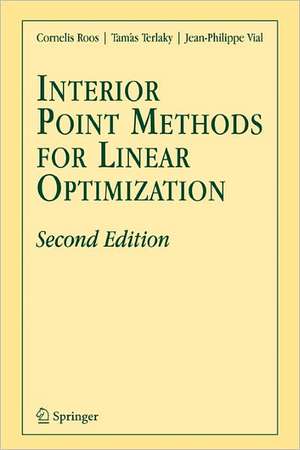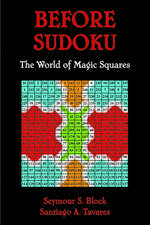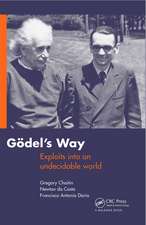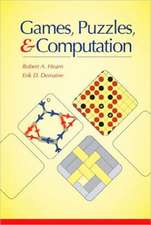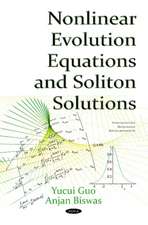Interior Point Methods for Linear Optimization
Autor Cornelis Roos, Tamás Terlaky, J.-Ph. Vialen Limba Engleză Paperback – 29 oct 2010
| Toate formatele și edițiile | Preț | Express |
|---|---|---|
| Paperback (1) | 401.24 lei 6-8 săpt. | |
| Springer Us – 29 oct 2010 | 401.24 lei 6-8 săpt. | |
| Hardback (1) | 408.74 lei 6-8 săpt. | |
| Springer Us – 7 sep 2005 | 408.74 lei 6-8 săpt. |
Preț: 401.24 lei
Nou
Puncte Express: 602
Preț estimativ în valută:
76.79€ • 79.33$ • 63.91£
76.79€ • 79.33$ • 63.91£
Carte tipărită la comandă
Livrare economică 25 martie-08 aprilie
Preluare comenzi: 021 569.72.76
Specificații
ISBN-13: 9781441938879
ISBN-10: 1441938877
Pagini: 524
Ilustrații: XXIV, 497 p.
Dimensiuni: 155 x 235 x 38 mm
Greutate: 0.73 kg
Ediția:Softcover reprint of hardcover 1st ed. 2005
Editura: Springer Us
Colecția Springer
Locul publicării:New York, NY, United States
ISBN-10: 1441938877
Pagini: 524
Ilustrații: XXIV, 497 p.
Dimensiuni: 155 x 235 x 38 mm
Greutate: 0.73 kg
Ediția:Softcover reprint of hardcover 1st ed. 2005
Editura: Springer Us
Colecția Springer
Locul publicării:New York, NY, United States
Public țintă
ResearchCuprins
Introduction: Theory and Complexity.- Duality Theory for Linear Optimization.- A Polynomial Algorithm for the Self—dual Model.- Solving the Canonical Problem.- The Logarithmic Barrier Approach.- Preliminaries.- The Dual Logarithmic Barrier Method.- The Primal—Dual Logarithmic Barrier Method.- Initialization.- The Target-following Approach.- Preliminaries.- The Primal-Dual Newton Method.- Applications.- The Dual Newton Method.- The Primal Newton Method.- Application to the Method of Centers.- Miscellaneous Topics.- Karmarkar’s Projective Method.- More Properties of the Central Path.- Partial Updating.- Higher-Order Methods.- Parametric and Sensitivity Analysis.- Implementing Interior Point Methods.
Recenzii
From the reviews of the second edition:
"The second edition of this successful book on interior point methods for linear optimization appears eight years after the first one. It presents a unified framework for these algorithms and it is a comprehensive treatment of linear optimization from the perspective of interior point methods. … The presentation is clear and comprehensible, but concise, it comes along with many examples and illustrations … . Almost all aspects of interior point methods are discussed in this highly recommendable book … ." (Petra Huhn, Mathematical Methods of Operations Research, Vol. 65 (1), 2007)
"The second edition of this successful book on interior point methods for linear optimization appears eight years after the first one. It presents a unified framework for these algorithms and it is a comprehensive treatment of linear optimization from the perspective of interior point methods. … The presentation is clear and comprehensible, but concise, it comes along with many examples and illustrations … . Almost all aspects of interior point methods are discussed in this highly recommendable book … ." (Petra Huhn, Mathematical Methods of Operations Research, Vol. 65 (1), 2007)
Textul de pe ultima copertă
Linear Optimization (LO) is one of the most widely applied and taught techniques in mathematics, with applications in many areas of science, commerce and industry. The dramatically increased interest in the subject is due mainly to advances in computer technology and the development of Interior Point Methods (IPMs) for LO.
This book provides a unified presentation of the field. The authors present a self-contained comprehensive interior point approach to both the theory of LO and algorithms for LO (design, convergence, complexity, asymptotic behaviour and computational issues). A common thread throughout the book is the role of strictly complementary solutions, which play a crucial role in the interior point approach and distinguishes the new approach from the classical Simplex-based approach.
The approach to LO in this book is new in many aspects. In particular the IPM and self-dual model based development of duality theory is surprisingly elegant. The algorithmic part of this book contains a complete discussion of many algorithmic variants, including predictor-corrector methods, partial updating, higher order methods and sensitivity and parametric analysis.
The comprehensive coverage of the subject, together with the clarity of presentation, ensures that this book will be an invaluable resource for researchers and professionals who wish to develop their understanding of LO and IPMs. Numerous exercises are provided to help consolidate understanding of the material and more than 45 figures are included to illustrate the characteristics of the algorithms. A general understanding of linear algebra and calculus is assumed. The first chapters provide a self-contained introduction to LO for readers who are unfamiliar with LO methods; however these chapters are also of interest for others who want to have a fresh look at the topic.
Audience
This book is intended for the optimization researcher community, advanced undergraduate and graduate students who are interested to learn the fundamentals and major variants of Interior Point Methods for linear optimization, who want to have a comprehensive introduction to Interior Point Methods that revolutionized the theory and practice of modern optimization.
This book provides a unified presentation of the field. The authors present a self-contained comprehensive interior point approach to both the theory of LO and algorithms for LO (design, convergence, complexity, asymptotic behaviour and computational issues). A common thread throughout the book is the role of strictly complementary solutions, which play a crucial role in the interior point approach and distinguishes the new approach from the classical Simplex-based approach.
The approach to LO in this book is new in many aspects. In particular the IPM and self-dual model based development of duality theory is surprisingly elegant. The algorithmic part of this book contains a complete discussion of many algorithmic variants, including predictor-corrector methods, partial updating, higher order methods and sensitivity and parametric analysis.
The comprehensive coverage of the subject, together with the clarity of presentation, ensures that this book will be an invaluable resource for researchers and professionals who wish to develop their understanding of LO and IPMs. Numerous exercises are provided to help consolidate understanding of the material and more than 45 figures are included to illustrate the characteristics of the algorithms. A general understanding of linear algebra and calculus is assumed. The first chapters provide a self-contained introduction to LO for readers who are unfamiliar with LO methods; however these chapters are also of interest for others who want to have a fresh look at the topic.
Audience
This book is intended for the optimization researcher community, advanced undergraduate and graduate students who are interested to learn the fundamentals and major variants of Interior Point Methods for linear optimization, who want to have a comprehensive introduction to Interior Point Methods that revolutionized the theory and practice of modern optimization.
Caracteristici
Comprehensive, self-contained and up-to-date coverage of the subject Clear presentation An invaluable resource for students, researchers and professionals who wish to develop their understanding of linear optimization and interior point methods
